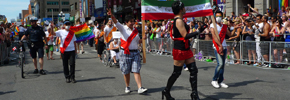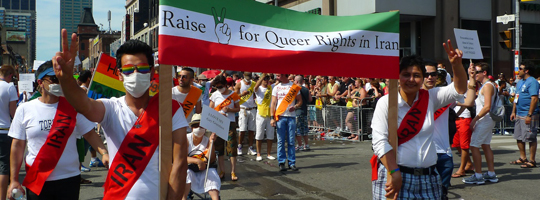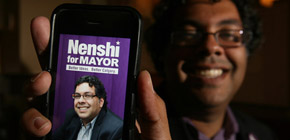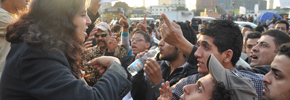Sima Sahar Zerehi – The forty people strong contingent of Iranian Railroad for Queer Refugees members, supporters and allies dressed in white campaign t-shirts flashing peace signs and shy smiles looked a bit somber against the backdrop of barely dressed revelers in feather boas and sequined speedos at Sunday’s Pride Parade in Toronto.
While other Pride participants brandished water guns and carnivalesque props the Iranian contingent was armed with sobering placards speaking to queer human rights. The message: we’re not here for a party but for a purpose.
The Iranian Railroad for Queer Refugees is a nonprofit, non-partisan organization based in Toronto Canada. The organization was established in 2008 in order to help Iranian refugees seek asylum based on their sexual orientation and gender identity.
As the name suggests, the organization models itself after the Underground Railroad used to smuggle African-American slaves to safety. The group strives to build bridges with lesbian, gay, transgendered and bi-sexual Iranians in Iran as well as abroad to support them in their journey to seek refuge in safe countries where their sexual orientation and gender identity will not place them at risk.
IRQR’s participation in the parade this year marked the fist Iranian contingent in Pride Toronto, a testament to the group’s efforts in raising the profile of queer issues amongst the community.
“Here we are taking a lot for granted,” lamented Arsham Parsi the founder of the Iranian Railroad for Queer Refugees. Parsi is one of the main figures of the Iranian queer rights movement in Toronto, acting as both an advocate and spokesperson for the community. He is the kind of person who is constantly on the go; fitting in this interview just before an appearance as an expert witness at a refugee hearing at the Immigration Refugee Board.
In speaking about why the group decided to participate as a contingent in Pride, Parsi explains, “We marched for those who can’t in Iran and we will march in Iran one day.”
“One of my friends told me I want God to take all my life but give me one day when I can walk on Church Street,” recounts Parsi.
Parsi who received over one hundred emails a day from Iranian queers in search of help, recounts heartbreaking stories of honour killings and suicides, anecdotes that chronicle the very real discrimination faced by queer Iranians.
Describing the situation in Iran for queer people Parsi notes, “Every second they have to deny themselves to be safe and secure. They have to put the mask on their faces in order to fit into the mainstream. If they are lucky they will be imprisoned or flogged with a hundred lashes, if not they can be executed.”
Parsi admits that the level of international attention and pressure on the Iranian government regarding their treatment of LGBTQ peoples has resulted in some tactical changes on the part of the Iranian regime.
He explains, “Right now we are fully aware that if any homosexual is sent to court the official court records will not state that they have been arrested and punished because of their sexual orientation but for unrelated reasons such as drinking alcohol or acting against social or national security.”
He notes, “The government tactics used on queers are the same tactics used against political dissidents and activists.”
While recognizing the significance of Pride for many, Parsi is also critical about the commercialization of the parade in Toronto. He explains, “Instead of marching for rights, people are marching to sell their products here.”
According to Parsi, the real struggles for gay, lesbian, bi-sexual, transgendered rights are happening in other parts of the world.
“I think the real marches for pride are happening in places like Ankara, Jerusalem, and Moscow,” offers Parsi.
It was Parsi’s participation in a Pride march in Turkey last May that motivated him to organize a contingent in Toronto Pride. He says that he was inspired by the courage of the Iranian queer community in Turkey.
“Turkey is no t a safe place for queers, on average one transgendered person is killed there every week, but thirty people were there – we didn’t wear any masks.”
The group’s decision to participate in a march in Turkey regardless of the possible repercussion inspired Parsi and his colleagues in Canada to join the Toronto march.
Parsi admits that the previous generation of queer activists contributed a great deal to the human rights struggle, opening doors for people like him, he now believes that it’s his generation’s turn to give back.
According to Parsi, “Iranian LGBTQs living outside of Iran have a deep responsibility.”
He adds, “We have to contribute to this cause for the next generation.”
While many of the participants in the contingent were young people under the age of thirty, the contingent also included others. An elderly woman was among the group holding up a placard that read: I LOVE MY Gay Grandson.
The elderly grandmother became involved with the group when she sought Parsi’s assistance in order to advocate for her 17 year old grandson who was having difficulties with his mother after coming out of the closet.
The participation of allies across all generations speaks to the progress made in terms of queer rights in the Iranian community in Toronto, Parsi explains,
“In the past few years we’ve receive some significant support, people in Toronto have changed a lot, the new generation who have come to Canada are much more tolerant.”
However he is quick to warn that the work is far from over, “Unfortunately not all members of the Iranian community are aware of diversity,” offers Parsi.
“Sometimes people have the same dictatorship inside them that is shown by the Iranian regime,” admits Parsi.
He adds, “when people don’t accept diversity, when they send their kids to doctors for electric shock to cure them of their queerness, when they try to marry off their gay sons to women, these are the examples of ignorance and intolerance.”
In speaking about real life examples of discrimination Parsi recounts a story shared by a male to female trans person from the Iranian community in Toronto.
Parsi recounts, “She dressed as a woman as that’s what she self-identified as and went to a money exchange – when they read an Iranian man’s name they told her to come back with the gentleman – she was forced to say I’m trans – they started laughing and pointing – it was very embarrassing – it was harassment.”
Parsi believes that such situations could be avoided if people in the Iranian community are better educated about queer issues.
Parsi admits “Still in Canada homophobia exists,” a reality substantiated by the fact that the small IRQR contingent was escorted by four police officers, assigned to the group by parade organizers for their protection.
In order to protect themselves or their loved ones and family back in Iran some members of the group selected to conceal their faces. In speaking to this issue Parsi noted, “Even in Canada maybe some people want to harm them – they think of their family in Iran and what could happen to them.”
Having your family members threatened because of your activism and sexual orientation is something that Parsi is intimately aware of.
After years of hiding, Parsi finally revealed his sexual orientation to his family coming out to his family in 2008.
As Parsi was often an outspoken advocate for queer rights outside of Iran, his family became an easy target.
Parsi states, “My family received lots of threats – after I had interviews on television our windows were broken, our home marked by graffiti.”
He ads, “Last December it was no longer safe for my family to stay in Iran. My twelve-year-old sister was dismissed from school; two men later identified as Basij agents in the street beat up my twenty-seven-year-old sister.”
Parsi explains what forced them to finally flee Iran, “a file in a Shiraz court was opened against my family for promoting immoral behaviour, corruption and homosexuality.”
Currently, Parsi’s family is in Turkey waiting to join him in Canada as asylum seekers.
In ending our interview Parsi asks me to share a few messages with our readers, “I would like to ask all your readers to work with each other. If you have any questions, any concerns, let’s improve our knowledge about diversity. We have to be united and be together. I would like to ask them to bring their questions and concerns out of the closet and onto the kitchen table.”
With Pride out of the way, Parsi is focusing his attention on his new project, an autobiography chronicling his experiences from Iran to Canada. He chuckles that this is only volume one of his life as he is only 30 years old. The book is scheduled to be sent to the publisher in September.
To learn more about the Iranian Railroad for Queer Refugees visit www.irqr.net
To read articles about queer rights from an Iranian perspective visit www.nedamagazine.net






